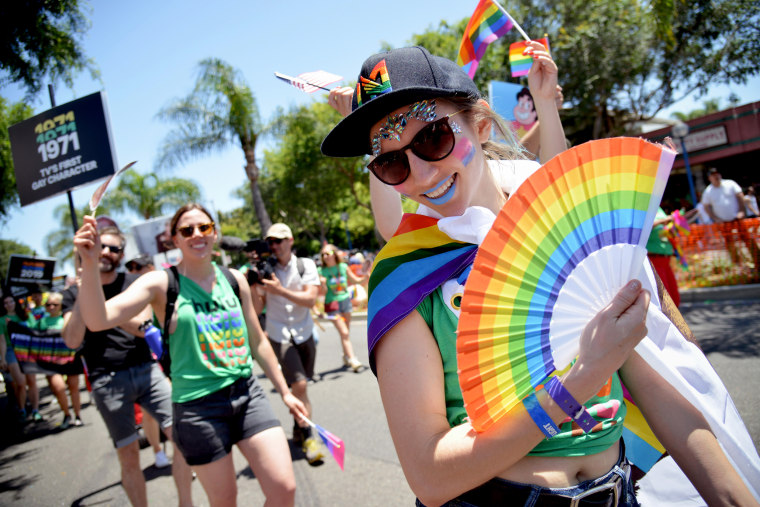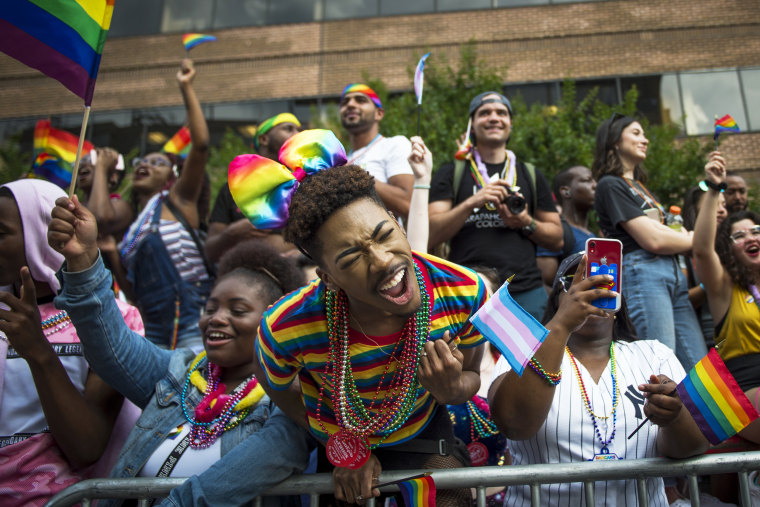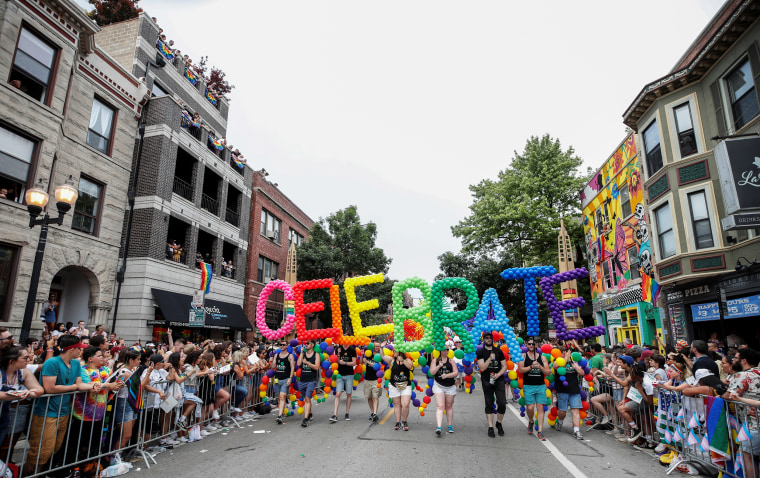Pride 2021: Big cities ‘playing the safe card’ with small gatherings, virtual events
Holly Duchmann, who lives in Lafayette, Louisiana, plans to attend a Pride celebration for the first time this year.
“In the years before the pandemic, while I was out to my friends, I was still really scared to go to Pride,” Duchmann, 27, said. “Because I’m bisexual, I kind of pass as straight a lot, and so that kind of created anxiety with me for years, making me feel like I didn’t really belong in the LGBT community.”
She felt more accepted after finding queer community through her roller derby team, and in 2020, she was looking forward to going to her first Pride event. She even picked up pieces of “extravagant” clothing here and there to wear. But then everything was canceled because of the pandemic, and, during quarantine, she turned to TikTok to feel connected to other LGBTQ people.
“The pandemic helped me realize I need to celebrate life when I can,” she said. “It’s like being cooped up made me want to burst out. So I’m fully vaccinated and making plans with friends to go all out this year.”
Duchmann plans to go to New Orleans to celebrate, though New Orleans Pride, which has organized the city’s main Pride events in the past, disbanded in 2020. There’s no central Pride event planned this year, but Duchmann isn’t worried.
“I really see Pride as being larger than just an event held by one organization,” she said. “NOLA is great about gathering and celebrating. It’s kind of like Mardi Gras. It’s a whole season.”
In the last few decades, Pride has been celebrated in cities around the globe with bigger and bigger events such as parades, marches and protests. In June 2019, an estimated 5 million people attended NYC’s annual Pride march, which coincided with WorldPride, which moves to a different major city each year. The celebrations were expected to be just as big in June 2020, the 50th anniversary of the first Pride march — then called Christopher Street Liberation Day — which began a year after the Stonewall Riots of June 1969, a dayslong protest that began after police raided the Stonewall Inn, a gay bar in downtown Manhattan.
But in April 2020, the pandemic brought plans for the 50th anniversary of Pride to a halt, forcing event organizers across the U.S. to pivot to all-virtual programming. Now, Pride — in New York and beyond — will return with a mix of in-person and virtual events. Organizers are balancing concerns about safety with increasing vaccination rates and the LGBTQ community’s excitement to return to Pride after a year of social distancing.
‘More strategic’ virtual programming
Last spring, the group behind NYC Pride, the country’s biggest annual Pride celebration, canceled its in-person march for the first time in a half-century because of the Covid-19 crisis, and then had two months to create a virtual event in June.
“That was a shock that we had to think about very quickly on our feet to adapt to,” Dan Dimant, media director for Heritage of Pride, the group behind NYC Pride, said. “We did our best, but what we had this time around was the luxury of time and foresight.”
This year, Heritage of Pride will host some face-to-face events — like its annual street fair — but its well-known march, which has attracted millions in previous years, won’t be coming back in the same way just yet.
NYC Pride organizers will hold virtual events like a family movie night, a human rights conference and a rally, among others. It will also hold its usual Pride march on June 27, though it will be mostly virtual with “in-person elements that are to be determined,” Dimant said, adding that any in-person element would take place in a supervised area with perimeters to limit attendance.
“We put together a much more strategic virtual program for most of our events, and we’ve also kind of left the door open for most of this year to kind of wait and see what we could do in person,” Dimant said. “We believe that we certainly can’t have millions of spectators in one massive crowd just yet. It’s just too soon for that. But there are some events that we can do safely in person.”
‘Playing the safe card’
Other groups in large cities are organizing their events similarly.
Los Angeles Pride will host a free streaming concert June 10 on TikTok featuring Charlie XCX, a virtual “Thrive With Pride Celebration” on ABC7. LA Pride will also debut its “LA Pride Makes a Difference” volunteer calendar, which will enable people to volunteer — both in-person and virtually — for local nonprofits that support LGBTQ people.

Noah Gonzalez, the vice president of the board of directors for the Christopher Street West Association, the nonprofit behind LA Pride, said its signature parade and festival, which in 2018 drew more than 100,000 attendees and participants, can take six months to a year to plan, so the board had to make a decision about how to host the events in December.
“We had no idea where we were going to be, so we had to plan for what we knew at the time, and keeping the responsibility and safety in mind, we knew we could do something virtual,” he said. He said the group’s in-person events — the volunteer opportunities — allow people to decide what level of exposure they’re comfortable with, and don’t involve large crowds.
“From a celebratory perspective, we’re sort of pulling back a little bit and playing the safe card, but when it came to giving back to the community or being involved in community, our perspective was … we will create these opportunities and bring them to the community, and you can decide what you would like to do,” he said.
Capital Alliance Pride in Washington, D.C., which in pre-Covid-19 years attracted an estimated 250,000 revelers, is also playing it safe with a Colorful Pridemobile Parade on June 12.

Some Pride organizers in big cities have committed to larger in-person celebrations, but they are limiting capacity, adhering to strict health requirements or not holding their events until the fall.
LA Pride will host a Pride night at Dodgers Stadium on June 11, with a special package available to fully vaccinated attendees, and an in-person outdoor LGBTQ movie night on June 26. Similarly, San Francisco Pride is having two Pride movie nights on June 11 and 12 at Oracle Park and a Black Liberation Event at the African American Art & Culture Complex on June 18.
Chicago Pride plans to bring back its Pride in the Park concert in person, with Chaka Khan and Tiesto as headliners, but the event is ticketed, and attendees have to verify that they’ve been vaccinatedor provide other health information through an app no more than 12 hours before arriving to the two-day event, which takes place June 26 and 27.
“We worked with [the app] Health Pass by CLEAR so that we could create a very safe environment where people [who] are either tested or have been vaccinated are the only people that can come into the event right now,” Dustin Carpenter, president and lead organizer for Pride in the Park, said.

Atlanta Pride also plans to host a festival, though the group traditionally doesn’t celebrate until mid-October. The events will take place in Piedmont Park, which is outdoors, unfenced and allows for social distancing, Jamie Fergerson, executive director of Atlanta Pride, said.
“There’s a lot of concern about health and safety, obviously,” Fergerson said. “People have a lot of questions, and we — as a nonprofit organization that works for a community that’s been historically marginalized in a number of ways, including access to health care and access to good health care — we take health and safety very seriously.”
Some events are still on standby. In Philadelphia, Philly Pride Presents planned to host a festival on Sept. 4, but shared on its Facebook page Friday that the event is “a work in progress” and “not yet ‘fully open’” after the city issued guidance on reopening. Pride Houston has a few smaller events listed on its website, including Rock the Runway, a Pride fashion show, and said a “big announcement” is coming this month.
Other groups, like Boston Pride, have postponed their usual June festivities until the fall.
Some LGBTQ people said, regardless of the number of precautions taken, they don’t feel safe attending in-person Pride events just yet.
“I wouldn’t feel comfortable attending a Pride event as a fully vaccinated person, because I don’t know who is vaccinated and who is not,” Justice Dominguez, who is 24 and lives in Corpus Christi, Texas, said in an email. “Even with social distancing and mask requirements, it still feels like a risk. We know that less than half of all U.S. adults are fully vaccinated (per CDC). I thought these numbers would discourage Pride organizers but I was wrong.”
Other LGBTQ people said they won’t be attending large Pride celebrations and will instead attend community-run events, such as New York’s Queer Liberation March, which is organized by the activist group Reclaim Pride, started by community activists in 2019 as an alternative to NYC Pride.
“Being a transgender woman of color, Pride celebrations at large have not included the trans community,” Houston resident Eden Torres, 36, said. “I am moving back to NYC this summer after 13 years in Texas. I will attend any grassroots, no corporation, trans-centered Pride celebrations, but will not participate in corporate Prides any longer.”
But Duchmann isn’t alone in her excitement for Pride festivities — some people are also looking forward to finally being face-to-face.
Patrick Murphy, 71, of Santa Fe, New Mexico, said he and his partner of 49 years will be attending an in-person event.
“We believe that we must continue to show the world that we are still here and will always be strong,” Murphy said. “We survived AIDS and Covid! Just by being there shows the younger generation of LGBT people that they do have a future.”